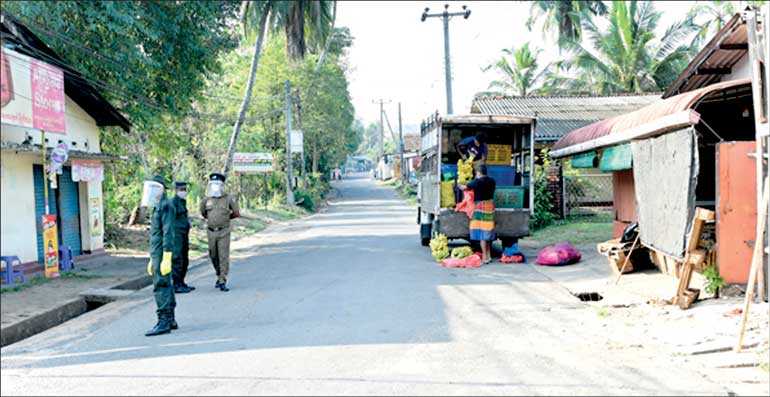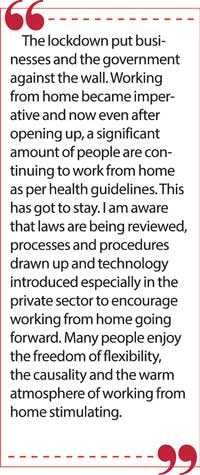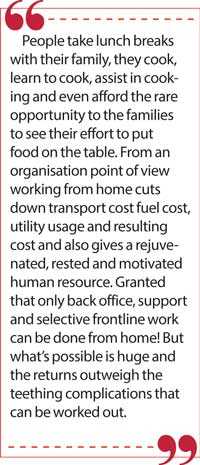Thursday Feb 19, 2026
Thursday Feb 19, 2026
Monday, 1 June 2020 00:15 - - {{hitsCtrl.values.hits}}

The country is back in action after almost a two-month lockdown. Yet the virus runs amok. What started with one random infection of a foreign national in the country has progressed unfortunately to over  1,000 infected by now. Reasons are many. However it must be appreciated that all efforts are made to contain the spread and stop the propagation of clusters.
1,000 infected by now. Reasons are many. However it must be appreciated that all efforts are made to contain the spread and stop the propagation of clusters.
Every eventuality, every unforeseen step, every decision with regard to allowing the mobility of society will have its positive and negative impact. However opening up is the need to allow regaining of livelihoods and kick starting the economy; not only for businesses and industry per se, but affording the opportunity to the majority of daily wage earners and the self-employed trader or businessman to recover is vital.
Economists talk about a ‘U curve’ revival which is slow and painful. They predict the impact on business, the money supply and the impact this would have on GDP (with our heavy service orientation) and GNP as well given the impact of lockdowns in the rest of the world which would result in unemployment and/or reduced remittances of our national working abroad. These dynamics, realities and ways out theorised is called as the ‘new normal’ and let it rest there.
Every dark cloud has a silver lining they say. All actions have a reaction. We speak of positive thinking in abundance. Therefore I believe in this debacle also there is a plethora of lessons learnt from which we can correct our fundamental mistakes of so called progress and development as nations and individuals.
From a ‘positivist’ approach the writer conducted a personal/private survey amongst a network of contacts representing a very wide strata of people about the ‘gains’ of the lockdown to our lives and these thoughts emanate from the responses received as learnings and good practices to continue.
Working from home
The lockdown kept us home. Of course the daily wage earner and the self-employed had no work to do or very much less to do. However the business/private sector and for the first time in the history of the government sector I believe, the working from home concept was formerly institutionalised. Working from home and/or flexi hours have been a long term affair and practice in the west. The west valued people’s lifestyle and economic constraints, the freedom and right of people to be duty bound towards their homes and families and they believed in the productivity that arises from the peace of mind you generate within the individual by facilitating same. That is the very reason that you see not only maternity leave but paternity leave as well, concepts such as compulsory or by choice working from home mechanisms and flexi hours of work.
However in this part of the world these concepts and practices did not gain ground. In countries like ours the only industry which even to an extent practiced working from home are the IT software industry, certain media institutions and creative houses and data/back office processing operations. The majority of the business sector shied away from this novelty; and in the government sector this was unheard of. There are good reasons of reliability, accountability and trust element on our people to put in the necessary number of hours from home unless the output can be logged in and measured.
Further, in a society and philosophy (which is slowly changing) where work measurement is thought as not possible no mechanisms have been drawn up to measure remote output; for that matter even in-house output in many an organisation. Our work ethic apart even the work processes, the documentation and labour laws have not been modified to capture the challenges and realities of working from home. Government has always been slow in digital savviness until recent times.
The lockdown put businesses and the government against the wall. Working from home became imperative and now even after opening up, a significant amount of people are continuing to work from home as per health guidelines. This has got to stay. I am aware that laws are being reviewed, processes and procedures drawn up and technology introduced especially in the private sector to encourage working from home going forward. Many people enjoy the freedom of flexibility, the causality and the warm atmosphere of working from home stimulating.
People take lunch breaks with their family, they cook, learn to cook, assist in cooking and even afford the rare opportunity to the families to see their effort to put food on the table. From an organisation point of view working from home cuts down transport cost fuel cost, utility usage and resulting cost and also gives a rejuvenated, rested and motivated human resource. Granted that only back office, support and selective frontline work can be done from home! But what’s possible is huge and the returns outweigh the teething complications that can be worked out.
E-commerce
People ran out of food. Couldn’t go to the supermarket for essentials. Children cried no pizza in some segments of society whilst some were crying for a basic meal. The vegetables, groceries and the needs  and need nots we buy from supermarkets could not be done. Then the bills had to be paid. Mobiles to electricity to water. Service providers were asked by the Government not to discontinue services but bills had to be paid. Sending money for various purposes by traditional methods became impossible.
and need nots we buy from supermarkets could not be done. Then the bills had to be paid. Mobiles to electricity to water. Service providers were asked by the Government not to discontinue services but bills had to be paid. Sending money for various purposes by traditional methods became impossible.
The other side of the equation were the sellers and the service providers. Their income just vanished and survival became a problem. Turning to E-commerce solutions was the only option. Traders opened up e-business platforms for selling and supply chain replenishment! Today from the mega supermarket products, to vegetables, cuisine to rice and curry, cake to coke can be ordered online and the goods are delivered. The housewife today has become an e commerce specialist. Benefits are quick accessibility, less commuting, saving on fuel and less rushed marketing for the consumer. And increased revenue and stability through the online space for businesses. The e banking and utility payments online has normalised. The digital divide has narrowed and has to be the way forward.
My grocer my hero plus doorstep delivery
I belong to the generation when growing up had the bread man visiting the neighbourhood. So did the milkman, fish-man, vegetable vendor and the paper man. For the rest of our needs we went to the ‘corner kade’ or neighbourhood grocer who had everything! Well everything essential minus the junk we load our trolleys at supermarkets through impulse buying! Nostalgic! The advent of supermarkets or one-stop-shops killed those simple services and livelihoods.
Development yes. Progress yes! Choice yes more than we need targeted to empty our wallets. Convenience yes and no – try rush our super marketing and parking. Fresh and healthy? Not exactly. Cheap? No. So-called value addition has a price. We need supermarkets. But I strongly believe we must have a hybrid system!
We stopped going to the neighbourhood friendly grocer as he did not have fancy packing or eye-catching displays. But it was him/her who came to our rescue during the lockdown. The backdoor and gate was kept open for us. Some others delivered everything in their tuk tuk when you called. The ‘Malu malu’ fish vendor is back, the bread man is back. We appreciate them now, don’t we?
We in fact have created a sub economy and a new livelihood in the country unintentionally. And these products are much easy on the purse too… Easing the lockdown should not end this phenomenon! We can still buy the daily needs from the home visiting vendor.
Family bonds
Many that I have been speaking to highlighted on the ‘God given’ opportunity to spend more time with family… Understand each other, appreciate each other, and to strengthen bonds amongst family members. Of course a number of people complained of boredom and having to cope with an unknown creature called the spouse and their seldom seen characteristics. Some even said too much is painful but this lockdown by and large has given opportunities for children and parents so communicate.
Someone light-heartedly bantered, “I have been talking to my family these few weeks and they seem to be really nice people!” Behind this statement lies a social reality. Business and careers had almost stopped communication within families. The busy father hell bent on working for the next promotion or the businessman trying to make a quick buck, the working mum trying to make ends meet hardly had time for spouses or children.
Did this have to be so even before the lockdown? No! However this is how we had programmed our lives. We used to complain if our parents didn’t have time for us. But alas that doesn’t happen with the generations of today. They are happy not to be bothered by their parents because they have digital surrogate mothers or nannies called devises. They will only look up at parents when the neck hurts. Did the parents complain? Not many because it was a convenient way of keeping the kids off your back after a hard day. Result is a set of anti-social animals with lose values and often corrupt! The other side of the digital revolution.
The lockdown forced families to invent and innovate because being online 24/7 became impractical and costly. The core of the matter is prioritising and time management. After the first couple of weeks of  lockdown people prioritised differently and managed time better; doing things they would rather do and couldn’t do for a long time. Should this change after come out? Definitely not. We can take a stock of what is important to us and plan our lives and priorities. Hopefully the business and social fabric going ahead would be woven on these underpinnings – a set of men and women who would want to protect and preserve happiness regained without getting lost in the rat race.
lockdown people prioritised differently and managed time better; doing things they would rather do and couldn’t do for a long time. Should this change after come out? Definitely not. We can take a stock of what is important to us and plan our lives and priorities. Hopefully the business and social fabric going ahead would be woven on these underpinnings – a set of men and women who would want to protect and preserve happiness regained without getting lost in the rat race.
Death of the social animal
Some amongst us are called social animals. Especially the urban middle and high income society believes in meeting up, wining, dining and partying. Thank god it’s Friday nonsense! Have to meet friends always to de-stress myth. We haven’t done too badly without it during the last two months. Apart from the desperate one or two who have sneaked into the neighbours or a close by friends house with or without a curfew pass; the majority of people have stayed home. Instead digital parties started, the zoom drinking or chat sessions now a weekly thing over many Fridays. Safe, healthy and low cost!
Necessity is the mother of invention. No clubs, no discos, no parties. Not even congregating at funeral houses. That drama also has trickled down to an essential few attended affair. Post-lockdown can be and I foresee will be a continuation. Here is a rule of thumb if you can abstain from something or shut your mind off from something for 21 days you are likely to be able to live/be without it. Worth testing.
The post-lockdown period has so many challenges and restrictions which will compel us not to socialise. The pay cuts and business related reduced disposable income, the socially distanced moving and living concept and of course the hopefully re-discovered value system. The economic factor will play major role in limiting people spending out. This has to continue and result in economic advantages to individuals and society.
Alcohol and tobacco free living
Not much should be written here. Yes I am aware people with resources and connections don’t miss their drink or smoke. Not for sure. But there are many who have spent days and months without a drink and smoke! This is a habit which is difficult to kill. The beeline run to the wine stores when they were opened is an indication of addition.
However we have not heard of anyone dying due to lack of alcohol or smokes. People adopt. People survive. On the revival if many people can kick the habit it’ll be economically and health rewarding indeed. If not a total tobacco and alcohol free society, we will certainly have a society with reduced consumption and health rewards.
Domestic produce/self sufficiency
I believe we have been lost in a free enterprise. The opening up of the economy in 1977 was the start of development and progress as we know it! But at what cost? Neighbouring India still has not opened up fully. They have protectionist policies which still ensure that the domestic production and produce is not compromised by a tsunami of imports. In fact in the South Asian region I dare say with facts that we are the economy which opened up floodgates so freely that we are suffering many socio economic setbacks apart from the haves and the have nots divide.
The free market economy would have served us well if we directed our efforts to build an export oriented economy; that too out of the traditional goods of tea rubber and lately apparel. The main export being our capable labour to other countries mainly the Middle East, labour and talent which can be utilised for nation building is un-availed. Pathetic. We should have focused on commodities and natural resource backed production. An agriculture plan to make us self-sufficient would have ensured very much favourable balance of payments with less imports.
We missed the bus. The demand supply attraction and many other sweets of free economy has become a Trojan horse for us. In 2018 the share of agriculture in the country’s gross domestic product was only 7.8%. Industry contributed about 26% whereas services contributed to over 50%. Tourism has been another main economic activity. With the COVID impact on the world we already see the impact on the apparel sector, the overseas labour market and of course the tourism and related sectors.
With our main exports dwindling and imports being constant the foreign exchange drain and the trade deficit would have been of great concern. Therefore the decision to temporary suspend over hundred categories of items is a wise move. Most of these items have local substitutes and other options; or can be produced here. Some technology and infrastructure will have to be invested on but we must definitely convert our GDP to be more production enriched than services as they have heavy competition and less sustainability.
Time for a planned hybrid economic model has come. A domestic production based protectionist economy. A sustainable green economy. These won’t be populist choices or easily achieved with democracy. Try benevolent pro country autocracy. Or ‘covidocracy’ as proposed by the writer few weeks back in these columns.
Greatest lesson
COVID taught us that nature is supreme, that everything is impermanent and that ‘here and now’ and our mind-set is what is important. Buddha preached this over 2,500 years ago and many other religious leaders have propounded on these lines… We have been given many opportunities to realise this and chances to reform ourselves; we failed. Certainly for Sri Lanka this is a very significant debacle which totally changed our ways of living and thinking. So let’s pick up what’s good, shed what’s bad and march on; for the man who does the same thing over and over and expects different results is a fool! The new norm is live and let live; rest will follow.